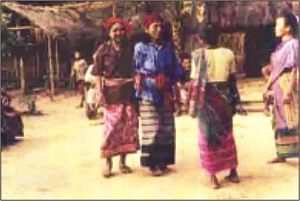Welcoming Wanna
Emran Hossain Emon, from Modhupur
The three-day harvest festival, Wanna, arranged by the indigenous Garo people of Modhupur, began yesterday with a view to uphold the ancient religious rites and rituals.Mandi, a community of the Garo people living in the Modhupur forest, has arranged the ancient festival for the third time since 2003, braving traumatic cultural conflicts between the tribal community and Bangalees. Members of the community in colourful dresses started gathering at the venue as Rugala, welcoming session of the festival, began in the early hours yesterday. According to their religious belief, Mishi Saljong, the supreme God, along with his daughter, son and other deities visit them after the harvest and the indigenous people start a fresh year through thanks-giving. The Garo people from Chunia, Peergachha, Hagurakuri, Kyajai, Sainyamari, Thanarbaid and Joynagachha villages in Modhupur in Tangail are taking part in the festival. With the rhythm of musical instruments Dama, Ghram, Adury and Nagara, the indigenous people welcomed their famous deities Shushmi, Tatara, Bagba and Goera. They also welcomed other guests, who turned up from different places. The nightlong programme includes Grik A, offering prayers through traditional war dance. On the second day of the festival, the tribal people will visit their neighbouring houses and take local drink, Michik Roa/Panthi Roa. Different types of food including Aksharu, pumpkin, Gomenda, sweet pumpkin, Ampeng, Thaja, Tharuri, three types of potato, Mi, Jum rice, and Gonashi, bean, will be offered to Middi , bamboo-made idol of god, through Jolana, a special dance, tonight. Ajia, Ray-Ray, and Sherjing are the names of traditional songs and dances to be performed throughout the festival. The programmes will continue until Wednesday noon and conclude by the sacrifice of the musical instruments. The concluding session of the festival, which is usually conducted by a priest, is known as Bisiri. Though the festival had earlier been held regularly at every Mandi home, it was stopped gradually after the government officially stopped Habahuchhaa and Jum cultivation in 1956 under the East Pakistan Tennasi Act imposed in 1927. The traditional festival took a new dimension and was renamed after the Garo people braced Christianity and Christian missionaries started arranging same types of programmes. Each programme costs a lot as it requires several expensive things. When not an inch of land is left for Jum cultivation, it is impossible to continue all the rites and rituals, said the Mandi families in a helpless tone.
|

'Wanna', a three-day harvest festival of the Garo people, began yesterday at Madhupur in Tangail with traditional fervour. PHOTO: STAR |